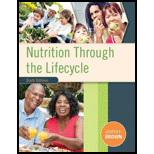
Concept explainers
To explain: Whether Person T was underweight or normal weight based on her body mass index when she weighed 107 pounds.
Introduction: Body mass index (BMI) is obtained by dividing weight (in kg) by square of height (in m). If the BMI is greater than 18.5, then it is considered underweight. The BMI of 18.5-24.9 comes under normal weight, and people with 25-29.9 are overweight, and people with BMI of 30 and higher have obesity.
Explanation of Solution
Person T is 5 ft 5 in. (1.65 m); her current weight is 107 pounds (48.53 kg) and her previous weight was 121 pounds (54.88 kg). Both her FSH and LH levels are low, and she cannot ovulate. After sometime, she regains 7 pounds and her LH level becomes normal, but her FSH level is still low and the luteal phase of her cycles is abnormally short. When her weight reaches 119 pounds (53.97 kg), her LH and FSH levels, ovulation, and menstrual cycles becomes normal.
The critical level of body fat (usually indicated by a body mass index over 20 kg/m2) is needed to trigger and sustain normal reproductive functions in women. Low levels of body fat during adolescence is related to delays in the onset of menstruation and reduced fertility later in life. Impaired fertility in underweight women often takes the form of delayed time to conception and amenorrhea. Lowered libido and reduced sperm production have been identified in underweight men with low levels of body fat.
The formula for the body mass index is as follows:
Substitute
Person T was underweight when she weighed 107 pounds as her BMI was 17.83.
Want to see more full solutions like this?
Chapter 2 Solutions
Nutrition Through the Life Cycle (MindTap Course List)
- After hearing this information, should Sue and Tim feel that their chances of having a child with a cleft lip are increased over that of the general population? Sue and Tim were referred for genetic counseling after they inquired about the risk of having a child with a cleft lip. Tim was born with a mild cleft lip that was surgically repaired. He expressed concern that his future children could be at risk for a more severe form of clefting. Sue was in her 12th week of pregnancy, and both were anxious about the pregnancy because Sue had had a difficult time conceiving. The couple stated that they would not consider terminating the pregnancy for any reason but wanted to be prepared for the possibility of having a child with a birth defect. The genetic counselor took a three-generation family history from both Sue and Tim and found that Tim was the only person to have had a cleft lip. Sues family history showed no cases of cleft lip. Tim and Sue had several misconceptions about clefting, and the genetic counselor spent time explaining how cleft lips occur and some of the known causes of this birth defect. The following list summarizes the counselors discussion with the couple. Fathers, as well as mothers, can pass on genes that cause clefting. Some clefts are caused by environmental factors, meaning that the condition didnt come from the father or the mother. One child in 33 is born with some sort of birth defect. One in 700 is born with a cleft-related birth defect. Most clefts occur in boys; however, a girl can be born with a cleft. If a person (male or female) is born with a cleft, the chances of that person having a child with a cleft, given no other obvious factor, is 7 in 100. Some clefts are related to identifiable syndromes. Of those, some are autosomal dominant. A person with an autosomal dominant gene has a 50% probability of passing the gene to an offspring. Many clefts run in families even when there does not seem to be any identifiable syndrome present. Clefting seems to be related to ethnicity, occurring most often among Asians, Latinos, and Native Americans (1 : 500); next most often among persons of European ethnicity (1 : 700); and least often among persons of African origin (1 : 1,000). A cleft condition develops during the fourth to the eighth week of pregnancy. After that critical period, nothing the mother does can cause a cleft. Sometimes a cleft develops even before the mother is aware that she is pregnant. Women who smoke are twice as likely to give birth to a child with a cleft. Women who ingest large quantities of vitamin A or low quantities of folic acid are more likely to have children with a cleft. In about 70% of cases, the fetal face is clearly visible using ultrasound. Facial disorders have been detected at the 15th gestational week of pregnancy. Ultrasound can be precise and reliable in diagnosing fetal craniofacial conditions.arrow_forwardList three common causes of persistent nipple pain.arrow_forwardThe term _______________________ means pertaining to birth. natal perinatal postnatal prenatalarrow_forward
- Fertility specialists may advise a couple who wish to conceive a child to use an alkaline (basic) douche immediately before intercourse. What might the reasoning behind this advice be?arrow_forwardSherrise is a sexually active college student. On Saturday night, she has unprotected sex with her boyfriend. On Tuesday morning, she experiences the twinge of mid cycle pain that she typically feels when she is ovulating. This makes Sherrise extremely anxious that she might soon learn she is pregnant. Is Sherrises concern valid? Why or why not?arrow_forwardWould ISCI be an option? Why or why not? Jan, a 32-year-old woman, and her husband, Darryl, have been married for 7 years. They have attempted to have a baby on several occasions. Five years ago, they had a first-trimester miscarriage, followed by an ectopic pregnancy later the same year. Jan continued to see her OB/GYN physician for infertility problems but was very dissatisfied with the response. After four miscarriages, she went to see a fertility specialist, who diagnosed her with severe endometriosis and polycystic ovarian disease (detected by hormone studies). The infertility physician explained that these two conditions were hampering her ability to become pregnant and thus making her infertile. She referred Jan to a genetic counselor. At the appointment, the counselor explained to Jan that one form of endometriosis (MIM 131200) can be a genetic disorder, and that polycystic ovarian disease can also be a genetic disorder (MIM 184700) and is one of the most common reproductive disorders among women. The counselor recommended that a detailed family history of both Jan and Darryl would help establish whether Jans problems have a genetic component and whether any of her potential daughters would be at risk for one or both of these disorders. In the meantime, Jan is taking hormones, and she and Darryl are considering alternative modes of reproduction. Using the information in Figure 16.4, explain the reproductive options that are open to Jan and Darryl.arrow_forward
 Nutrition Through The Life CycleHealth & NutritionISBN:9781337919333Author:Brown, Judith E.Publisher:Cengage Learning,
Nutrition Through The Life CycleHealth & NutritionISBN:9781337919333Author:Brown, Judith E.Publisher:Cengage Learning, Human Heredity: Principles and Issues (MindTap Co...BiologyISBN:9781305251052Author:Michael CummingsPublisher:Cengage Learning
Human Heredity: Principles and Issues (MindTap Co...BiologyISBN:9781305251052Author:Michael CummingsPublisher:Cengage Learning Medical Terminology for Health Professions, Spira...Health & NutritionISBN:9781305634350Author:Ann Ehrlich, Carol L. Schroeder, Laura Ehrlich, Katrina A. SchroederPublisher:Cengage Learning
Medical Terminology for Health Professions, Spira...Health & NutritionISBN:9781305634350Author:Ann Ehrlich, Carol L. Schroeder, Laura Ehrlich, Katrina A. SchroederPublisher:Cengage Learning





